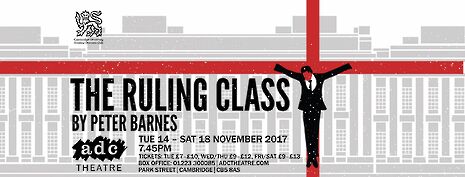The Ruling Class review: ‘a tale of madness and delusion’
Connor Dwyer can’t fault “the energy and precision of the acting” in The Ruling Class

There is one key aspect to The Ruling Class that simply cannot be faulted; the energy and precision of the acting of the Fresher Cantab actors in this production of Peter Barnes’ black comedy. Clear from the off is the commitment placed into perfecting the presentation of the complex characters of the play; each character is presented engagingly, professionally, and convincingly. The acerbic wit that has come to define the play in performances since 1968 pierces sharply through the storyline, and directly to the attention of the audience. The arrogance, delusion and naivety of the upper echelons of society, attempted to be mocked by this satirical piece, is dominantly displayed in Will Owen’s production; in this sense, the play is granted the underlying meaning it was always intended to have. Contextualised by a riling, though subtly humoured, patriotic rambling by traditional patriarch the 13th Earl of Gurney, the distinct themes of tradition, pride and patriotism are launched to repeatedly intersect a plot of growing madness, scheming, love and revenge.
“Each character is presented engagingly, professionally, and convincingly”
It is sadly here, however, that this production begins to distance itself from the great potential it holds. While the satire and wit is sharp, the building of necessary tension for some of the play’s most exaggerated scenes is simply not found. Great drama is not necessarily in the shocking and unexpected, but in how we are slowly, subtly, and dauntingly led into such scenes. The Ruling Class includes many such scenes of unexpected tragedy, violence, and ominous outbursts of lunacy, but the arising of these scenes, almost as though separated from the main plot, makes for a disjointed transition into the play’s most pivotal moments.
The end of Act 1 was perhaps the most confusing and chaotic scene of the play, and once again, made difficult to follow by its sudden explosiveness from a gentle and building plot, and the excitable acting performed by all on stage. Perhaps such confusion is a blessing and a curse; blessing in that truly enough, the complex psychological subplot of the play is exposed honestly and disturbingly, but yet remains a curse demonstrated in the bewildered look of many in the audience as they watch what may almost seem a pantomime if without context.
“The building of necessary tension for some of the play’s most exaggerated scenes is simply not found”
A first night performance is, of course, rarely without technical fault, and sadly, this was no exception. While the humour of this play regularly derives from the ridiculous and slap-stick, the professional edge necessary to this comedy was somewhat undermined by the poor and fractious use of sound effects, music, and, at times, lighting, leaving actors waiting on stage, or struggling to change scenes.
Despite this, as a tale of madness and delusion, class conflict, psychological thrills, and political deceit, The Ruling Class is a play that makes a thoroughly enjoyable evening’s entertainment, and the acting, for an all-Fresher cast, is not just admirable, but impressive. In particular, one must highlight the convincing performance of the character of Jack, 14th Earl of Gurney. A complex role, encompassing madness, passion, love, anger, and the presentation of concurrent sanity and insanity, the role was fulfilled to portray this elaborate character appropriately and passionately. Furthermore, perhaps the most significant character in building the satirical edge of the performance, the alcoholic butler Tucker, was performed without fault, giving to the play exactly what was to be expected from a surprising, loveable, yet oddly devious character.
With faults ironed out, and a consideration of how to build the intended tension to give the dramatic effect needed from the play’s most shocking and critical scenes, this is a play with great potential, but it is undoubted that potential already lies in those on the stage last night
 News / Colleges charge different rents for the same Castle Street accommodation2 March 2026
News / Colleges charge different rents for the same Castle Street accommodation2 March 2026 News / King’s hosts open iftar for Ramadan3 March 2026
News / King’s hosts open iftar for Ramadan3 March 2026 Theatre / Lunatics and leisure centres 4 March 2026
Theatre / Lunatics and leisure centres 4 March 2026 News / Angela Merkel among Cambridge honorary degree nominees27 February 2026
News / Angela Merkel among Cambridge honorary degree nominees27 February 2026 News / News in Brief: waterworks, wine woes, and workplace wins 1 March 2026
News / News in Brief: waterworks, wine woes, and workplace wins 1 March 2026







